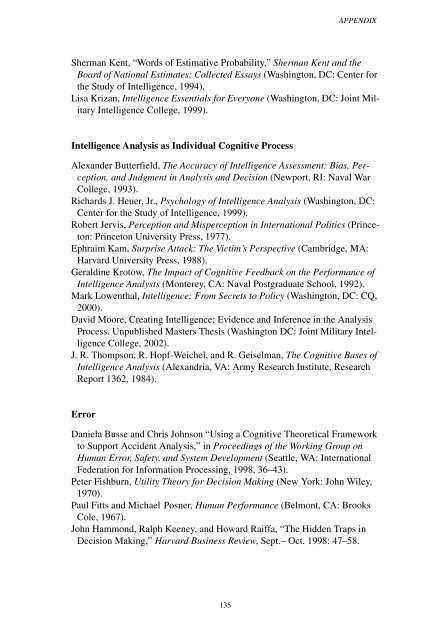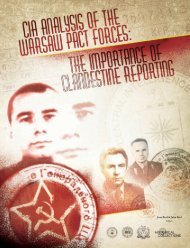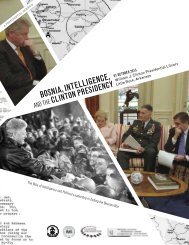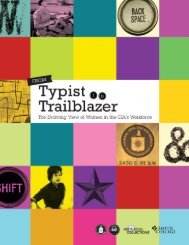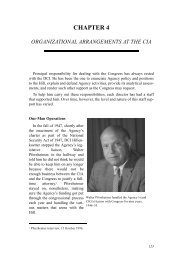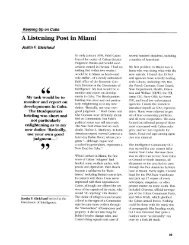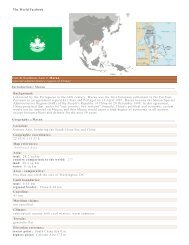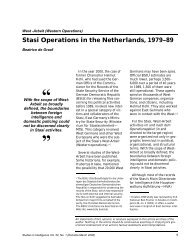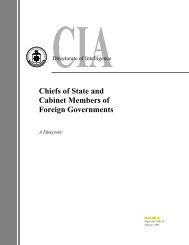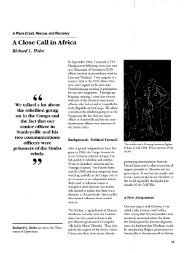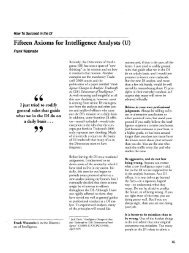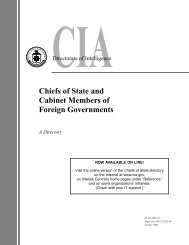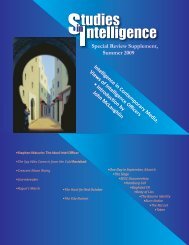Analytic Culture in the U.S. Intelligence Community (PDF) - CIA
Analytic Culture in the U.S. Intelligence Community (PDF) - CIA
Analytic Culture in the U.S. Intelligence Community (PDF) - CIA
Create successful ePaper yourself
Turn your PDF publications into a flip-book with our unique Google optimized e-Paper software.
APPENDIX<br />
Sherman Kent, “Words of Estimative Probability,” Sherman Kent and <strong>the</strong><br />
Board of National Estimates: Collected Essays (Wash<strong>in</strong>gton, DC: Center for<br />
<strong>the</strong> Study of <strong>Intelligence</strong>, 1994).<br />
Lisa Krizan, <strong>Intelligence</strong> Essentials for Everyone (Wash<strong>in</strong>gton, DC: Jo<strong>in</strong>t Military<br />
<strong>Intelligence</strong> College, 1999).<br />
<strong>Intelligence</strong> Analysis as Individual Cognitive Process<br />
Alexander Butterfield, The Accuracy of <strong>Intelligence</strong> Assessment: Bias, Perception,<br />
and Judgment <strong>in</strong> Analysis and Decision (Newport, RI: Naval War<br />
College, 1993).<br />
Richards J. Heuer, Jr., Psychology of <strong>Intelligence</strong> Analysis (Wash<strong>in</strong>gton, DC:<br />
Center for <strong>the</strong> Study of <strong>Intelligence</strong>, 1999).<br />
Robert Jervis, Perception and Misperception <strong>in</strong> International Politics (Pr<strong>in</strong>ceton:<br />
Pr<strong>in</strong>ceton University Press, 1977).<br />
Ephraim Kam, Surprise Attack: The Victim’s Perspective (Cambridge, MA:<br />
Harvard University Press, 1988).<br />
Gerald<strong>in</strong>e Krotow, The Impact of Cognitive Feedback on <strong>the</strong> Performance of<br />
<strong>Intelligence</strong> Analysts (Monterey, CA: Naval Postgraduate School, 1992).<br />
Mark Lowenthal, <strong>Intelligence</strong>: From Secrets to Policy (Wash<strong>in</strong>gton, DC: CQ,<br />
2000).<br />
David Moore, Creat<strong>in</strong>g <strong>Intelligence</strong>: Evidence and Inference <strong>in</strong> <strong>the</strong> Analysis<br />
Process. Unpublished Masters Thesis (Wash<strong>in</strong>gton DC: Jo<strong>in</strong>t Military <strong>Intelligence</strong><br />
College, 2002).<br />
J. R. Thompson, R. Hopf-Weichel, and R. Geiselman, The Cognitive Bases of<br />
<strong>Intelligence</strong> Analysis (Alexandria, VA: Army Research Institute, Research<br />
Report 1362, 1984).<br />
Error<br />
Daniela Busse and Chris Johnson “Us<strong>in</strong>g a Cognitive Theoretical Framework<br />
to Support Accident Analysis,” <strong>in</strong> Proceed<strong>in</strong>gs of <strong>the</strong> Work<strong>in</strong>g Group on<br />
Human Error, Safety, and System Development (Seattle, WA: International<br />
Federation for Information Process<strong>in</strong>g, 1998, 36–43).<br />
Peter Fishburn, Utility Theory for Decision Mak<strong>in</strong>g (New York: John Wiley,<br />
1970).<br />
Paul Fitts and Michael Posner, Human Performance (Belmont, CA: Brooks<br />
Cole, 1967).<br />
John Hammond, Ralph Keeney, and Howard Raiffa, “The Hidden Traps <strong>in</strong><br />
Decision Mak<strong>in</strong>g,” Harvard Bus<strong>in</strong>ess Review, Sept.– Oct. 1998: 47–58.<br />
135


